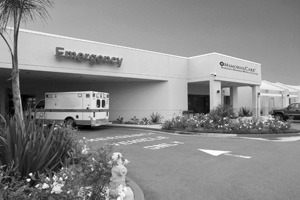Preparing for an Emergency Room Visit
Feb 01, 2008 09:46PM ● By Don Kindred
by Colleen Dubost
The ER at Saddleback Memorial – San Clemente.At one time or another, most of us have been to the Emergency Room, heard a story about an experience at the ER or at least seen it on television. A visit to the Emergency Room does not have to be a stressful or frightening experience. With the right information you can reduce anxiety and have a positive experience. Here are some guidelines to know when to come to the ER as well as tips for making your visit less stressful.
When to come to the Emergency Room
Marc Taub, MD, Medical Director of Emergency Services at Saddleback Memorial – San Clemente admits it can sometimes be difficult to know if you’re dealing with an emergency. “If you are concerned that you or a loved one has an emergency, it’s always better to get checked promptly,” says Dr. Taub. “We are always here to help, so never feel hesitant about coming to the ER. If you have questions and it doesn’t seem like a life-threatening problem, a good option is to first call your personal physician for advice. Most doctors have someone on call, even after-hours.”

The American College of Emergency Physicians (ACEP) offers a list of warning signs that indicate a medical emergency as well as health and safety information on their website at www.acep.org;
Difficulty breathing, shortness of breath
Chest or upper abdominal pain or pressure
Fainting, sudden dizziness, weakness
Changes in vision
Confusion or changes in mental status
Any sudden or severe pain
Uncontrolled bleeding
Severe or persistent vomiting or diarrhea
Coughing or vomiting blood
Suicidal feelings
Difficulty speaking
Shortness of breath
Unusual abdominal pain
If you experience any of the symptoms, you should call 911 immediately. It’s always better to be safe than sorry. If you are in doubt, call 911. Also, it’s important to know that for certain conditions, such as a heart attack or stroke, it is essential to call 911 because paramedics can deliver life-saving care en route to the hospital.
Bring a family member or friend
Karen Sharp, Manager of the Emergency Department at Saddleback Memorial - San Clemente has worked in emergency services for more than 25 years. During this time she has observed that whenever possible it is a good idea to bring someone else with you to the ER. “If your condition is serious, you may need someone to help provide information and communicate with staff,” says Sharp.
Marc Taub, MD and Karen Sharp, Manager of the ER at Saddleback Memorial.
Have your health history, medications and insurance card handy
According to many health care professionals, it is important that people be prepared with all of their health information. “When people come into the ER and have all their information handy, it makes the registration process a less stressful event,” says Sharp.
Make sure you keep the following items in a convenient place such as a wallet or purse so that you may grab them quickly when leaving your home. It’s also a good idea to keep a copy of these items with your spouse, family member or caregiver:
• A list of the medications you take allergies and major events in your health history
• Copies of any recent medical tests or procedures
• Names of your personal physicians
• Emergency contact information
• Health plan information
• Advanced healthcare directives
You will also want to make sure you answer all questions from the medical staff to the best of your ability. Knowing all the facts helps health professionals make a complete diagnosis and a treatment based on the information that you give them. Let the nurses or other staff know if there are any changes in the way you are feeling.
When in doubt, ask
Dr. Taub advises that if a doctor or nurse tells you something or asks you a question that you do not understand, make sure you ask them to clarify what they are saying. Also, if healthcare professionals are doing something that you want to know more about, just ask. “Don’t be afraid to ask questions,” says Taub, “We are here to help and educate you about your health.”
You could save a life! Saddleback Memorial – San Clemente offers CPR and first aid classes to the community all year long. For more information on educational programs and events at Saddleback Memorial Medical Center, call (949) 452-7255. b



